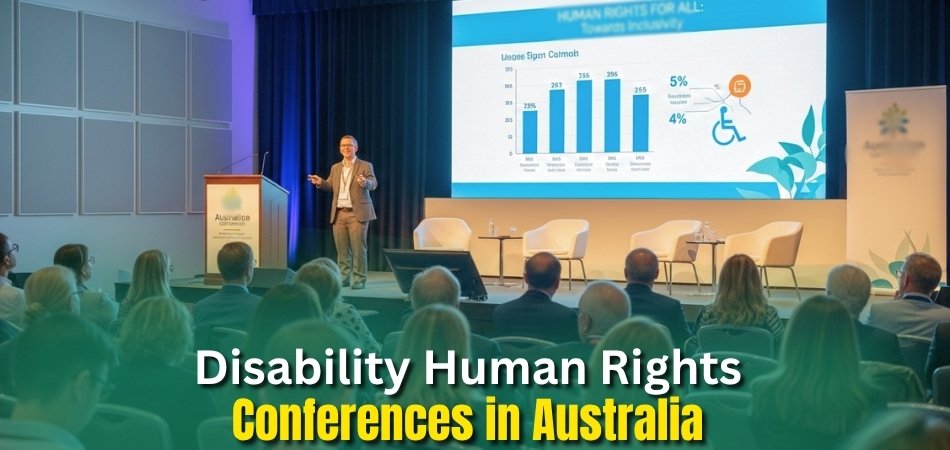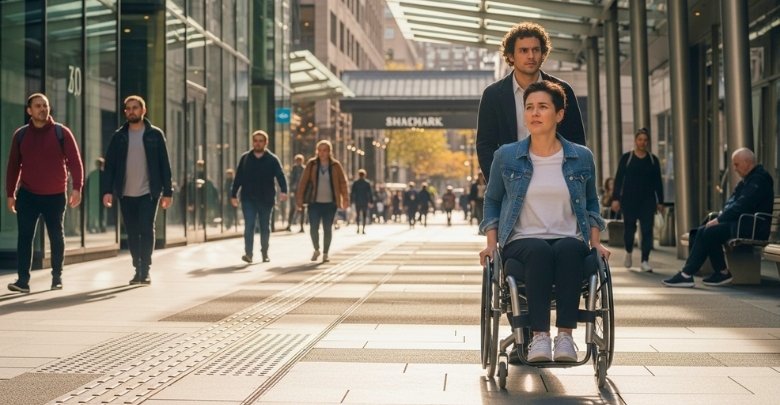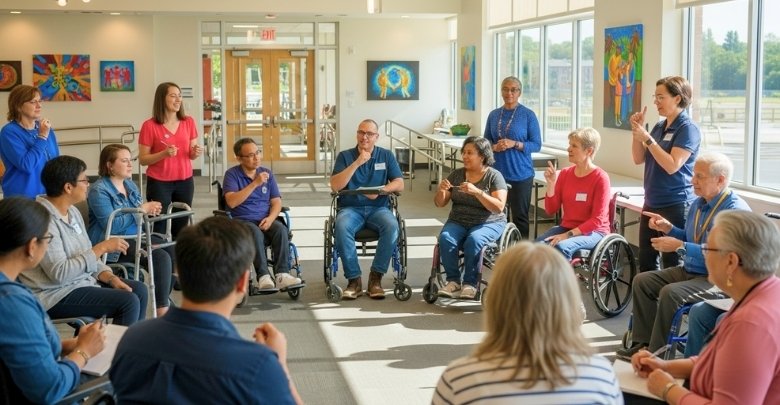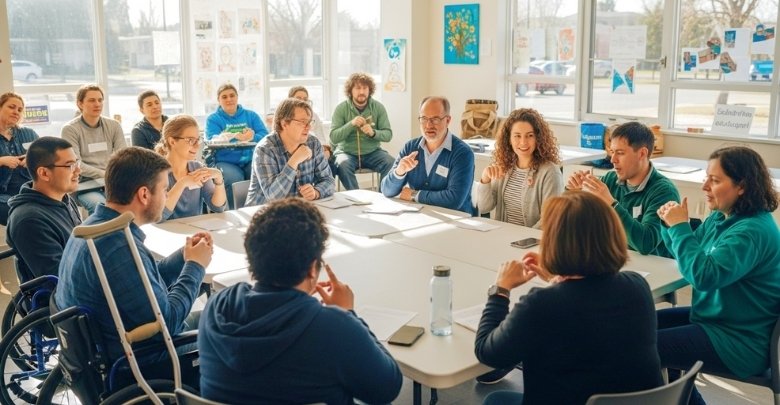Conversations about equality, access, and inclusion are growing stronger across Australia, and the top 10 disability human rights conferences in Australia play a key role in driving that progress. These events go beyond policies; they focus on real experiences, community voices, and practical actions that move society toward fairness and inclusion.
Events like the Global Conference on Gender and Disability Human Rights in Sydney, the ASID 2025 Conference on Intellectual Disability, and the International Disability and Diversity Conference bring people together to share research, ideas, and lived experiences. They show how collaboration between experts, advocates, and communities can drive lasting change.
By attending these conferences, participants gain insights, share experiences, and connect with communities working for change. Each gathering contributes to progress that affects everyday lives. Keep reading to discover the full list and see why these events matter now more than ever.
Top 10 Disability Human Rights Conferences in Australia
| Date | Conference List | Location |
| November 14-16, 2025 | Global Conference on Gender and Disability Human Rights (GCGDHR) | Sydney, Australia |
| 12–14 November 2025 | ASID 2025 Conference | Aerial Function Centre, University of Technology Sydney, Australia |
| December 10-12, 2025 | 2025 Research Conference of the Disability, Law and Society Network of Australia & Aotearoa New Zealand | University Technology Sydney, Australia |
| 28 February 2026 | Aged & Disability Expo, Sunshine Coast 2026 | Caloundra Indoor Stadium, North Street, Golden Beach, Queensland |
| 23 May to 26 May 2026 | Round Table Disability Conference (PrintDisability) | Adelaide, South Australia |
| 8 May 2026 | Aged & Disability Expo, Rockhampton 2026 | Rockhampton Showgrounds, New Exhibition Road, Wandal, Queensland, Australia |
| 12 Jun – 13 Jun 2026 | 2026 Sydney Disability Connection Expo | Sydney, Australia |
| 17-18 September 2026 | National Disability Summit | Melbourne, Australia |
| September 09-10, 2026 | International Conference on Disability and Diversity | Melbourne, Australia |
| 8 October 2025 | Aged & Disability Expo, Sydney 2025 | Rosehill Gardens, James Ruse Drive, Rosehill NSW, Australia |
1. Global Conference on Gender and Disability Human Rights (GCGDHR)
People from across the world come together at this conference in Sydney to discuss how gender, disability, and human rights connect in everyday life. Like many leading conferences in Australia, it highlights challenges in policy, advocacy, and equality. The event provides a platform for dialogue between academics, activists, and community leaders. It will take place from November 14–16, 2025, encouraging collaboration across different sectors to strengthen rights and inclusion.
2. ASID 2025 Conference
The Aerial Function Centre, University of Technology Sydney will host ASID 2025, focusing on intellectual disability research, practice, and lived experience. Professionals, families, and advocates will discuss ways to improve support systems and shape the future of disability rights. Taking place on 12–14 November 2025, the event is recognized as one of the key Australian gatherings in this field.
3. 2025 Research Conference of the Disability, Law and Society Network of Australia & Aotearoa New Zealand
In Sydney, Australia, this research conference brings legal scholars and disability advocates together. It explores issues of justice, law reform, and rights for people with disabilities. With a strong focus on cross-country perspectives, the event examines lived experiences in relation to policy. It will be held on December 10–12, 2025, hosted by the University of Technology Sydney.
4. Aged & Disability Expo, Sunshine Coast 2026
The Caloundra Indoor Stadium in Golden Beach, Queensland, will open its doors for the Sunshine Coast Expo. It’s a space where service providers, carers, and individuals connect directly about disability and aged care support. Visitors can explore practical solutions, equipment, and advice. The expo will run on 28 February 2026, helping communities find the resources they need in one place.
5. Round Table Disability Conference (PrintDisability)
Adelaide, South Australia, will host this important gathering that focuses on accessible formats and print disability inclusion. The conference is known for connecting libraries, disability services, and advocates to improve information access for people with print disabilities. It’s scheduled from 23 May to 26 May 2026, offering a collaborative environment for sharing updates in accessibility and inclusive publishing.
6. Aged & Disability Expo, Rockhampton 2026
At the Rockhampton Showgrounds in Queensland, the Rockhampton Expo will bring together disability and aged care providers. The event makes it easier for families and individuals to connect with organizations offering support and resources. Information sessions and displays will showcase practical solutions. This expo is confirmed for 8 May 2026, creating a valuable local hub for networking and awareness.
7. 2026 Sydney Disability Connection Expo
The Sydney Disability Connection Expo is a large-scale event connecting people with disability, carers, and providers under one roof. Attendees can explore services ranging from therapy to education and community support. It offers direct interaction with organizations that support inclusion. The expo will take place in Sydney on June 12–13, 2026, helping participants navigate the NDIS and related services.
8. National Disability Summit
City of Melbourne will again host the National Disability Summit, an event that examines policy, leadership, and sector development. Advocates, service providers, and policymakers gather to share insights on reforms and disability rights in practice. With a strong reputation nationally, the summit continues to spark important discussions. It is scheduled for 17–18 September 2026, at a central Melbourne venue.
9. International Conference on Disability and Diversity
Taking place in Melbourne, Australia, this conference will welcome researchers, practitioners, and community leaders to discuss diversity and disability rights. Its sessions focus on equality, social justice, and access across different cultural contexts. The gathering provides a mix of research and applied practice. It is set for September 9–10, 2026, giving international and Australian delegates a platform to connect.
10. Aged & Disability Expo, Sydney 2025
The Rosehill Gardens venue in Sydney will host the Aged & Disability Expo, providing a broad showcase of services and products for seniors and people with disabilities. Families, carers, and community members can meet providers face-to-face. The expo also includes live demonstrations and information stands. It is confirmed for 8 October 2025, serving as an important networking point in New South Wales.
How Disability Rights Shape Everyday Access in Australia?
Disability rights in Australia are more than legal frameworks; they influence how people live, study, travel, and work daily. These rights ensure fairness and inclusion, but they are also about dignity and independence. Below are some of the most important areas where disability rights directly affect everyday life for individuals and families.
Transport Access
Public transport in Australia is guided by accessibility standards under the Disability Discrimination Act. Features like ramps, tactile ground markings, audio announcements, and priority seating make travel safer and more independent for people with disabilities. While challenges remain, particularly in regional areas, these measures help remove barriers and support equal participation in community and work life.
Education Inclusion
Disability rights in education require schools and universities to provide reasonable adjustments for learners. This may include support staff, assistive learning tools, or physical access to classrooms. By offering these accommodations, students with disabilities can participate in mainstream learning and achieve their goals. It reflects the idea that education is a right, not a privilege.
Healthcare Services
Australian healthcare providers must ensure that people with disabilities receive safe and accessible care. This can mean step-free access, accessible medical equipment, interpreters for communication needs, or staff trained in inclusive practices. Without these adjustments, patients may face barriers in receiving treatment. When healthcare becomes accessible, it allows individuals to maintain dignity and better manage their overall well-being.
Workplace Accommodations
Employment is central to independence, and disability rights protect access to fair work. Employers are required to offer reasonable accommodations such as adaptive technologies, flexible hours, or role adjustments. These changes ensure that employees with disabilities can contribute effectively while feeling respected. Inclusive workplaces not only strengthen individual lives but also benefit businesses through diverse skills and perspectives.
Everyday life in Australia is shaped by how well disability rights are implemented across transport, education, healthcare, and work. When these areas are accessible, people with disabilities are better able to live with independence and dignity. The ongoing challenge is ensuring these rights move beyond policy and become consistently reliable in real-world practice.
The Link Between Human Rights and Inclusive Policies
Australia’s approach to disability rights is rooted in its broader human rights framework. Laws and policies are not just national commitments; they are influenced by international standards and community advocacy. This connection ensures that disability rights are protected, monitored, and improved as part of Australia’s responsibility to uphold human dignity and equality. Here’s how Australia’s human rights commitments directly shape its disability laws and inclusive policies.
The Disability Discrimination Act (DDA)
The Disability Discrimination Act is Australia’s key legal instrument ensuring equal rights for people with disabilities. It protects individuals against unfair treatment in areas such as employment, education, and services. By linking directly to human rights principles, the Act places legal responsibility on institutions to actively prevent discrimination and promote accessible, inclusive practices nationwide.
Influence of International Conventions
Australia is a signatory to the UN Convention on the Rights of Persons with Disabilities (CRPD). This international treaty requires member states to remove barriers and promote equal participation. Australia’s domestic policies, including accessibility standards and workplace accommodations, are strongly shaped by these obligations, ensuring global principles are translated into practical protections for citizens with disabilities.
Policy Development and Reform
Human rights frameworks guide how new policies are created and existing ones are reformed. For example, the National Disability Insurance Scheme (NDIS) was built on principles of equality and empowerment. Policies shaped by these frameworks move beyond welfare to focus on choice, control, and participation, which align with the rights-based approach of disability inclusion.
Accountability and Monitoring
Human rights instruments ensure accountability in policy implementation. Independent bodies like the Australian Human Rights Commission oversee complaints, monitor progress, and enforce compliance. This framework allows individuals to challenge discrimination and pushes governments to strengthen protections. Regular reporting to international bodies under the CRPD also reinforces Australia’s commitment to meeting its disability rights obligations.
Australia’s disability policies are not created in isolation—they sit within a larger human rights landscape. By drawing from both domestic laws like the DDA and international commitments such as the CRPD, policies continue to evolve. This integration ensures people with disabilities are recognized not as recipients of charity, but as equal rights holders in society.
Challenges Still Faced by People with Disabilities
Despite strong legal protections and growing awareness, people with disabilities in Australia still face daily challenges. These issues highlight the gap between policy and lived reality. Barriers in accessibility, employment, technology, and services continue to limit full participation, showing that more progress is needed to achieve genuine equality and inclusion. Here are the main challenges still limiting true inclusion for people with disabilities.
Accessibility Gaps
Many public spaces, transport systems, and private facilities remain partially inaccessible. Steps without ramps, poorly designed signage, and limited accessible housing create daily obstacles. Although regulations exist, uneven implementation means people with disabilities still encounter significant barriers to moving freely and participating equally in community and social life.
Employment Barriers
Unemployment and underemployment rates for people with disabilities remain higher than average. Employers may hesitate to provide reasonable adjustments or overlook the value of inclusive workplaces. These barriers limit financial independence and reduce opportunities for individuals to contribute their skills fully. Employment inequality remains one of the most pressing ongoing challenges.
Digital Inclusion
Access to technology and online services is vital, yet many digital platforms still fail to meet accessibility standards. Websites, apps, and government services may lack screen reader compatibility or captioning. This digital divide excludes people with disabilities from essential services, information, and opportunities, especially as society becomes more digitally connected.
Rural and Remote Access
Living outside major cities often means fewer services and limited transport options for people with disabilities. Rural and remote communities may lack accessible healthcare, educational support, or specialized disability services. These geographic barriers further isolate individuals and restrict equal opportunities, highlighting the uneven distribution of support across Australia.
Service Delivery Delays (NDIS Challenges)
While the National Disability Insurance Scheme (NDIS) aims to provide choice and control, many participants face long wait times and complex processes. Delays in funding decisions and service approvals reduce trust in the system. These systemic inefficiencies create stress for individuals and families, making timely support a major ongoing struggle.
The challenges faced by people with disabilities show that laws and policies alone are not enough. Accessibility, employment, digital inclusion, and service delivery require constant attention and improvement. By addressing these gaps, Australia can move closer to a society where disability rights are not just promised, but fully lived and experienced every day.
What Role Do Communities Play in Advancing Disability Rights?
Community involvement is one of the strongest forces driving disability rights forward in Australia. Grassroots groups, advocacy networks, and local initiatives ensure that the voices of people with disabilities are heard, represented, and acted upon. Their work complements national policies by creating real, practical change at local and everyday levels. Here’s how communities across Australia play a vital role in driving disability rights and inclusion forward.
Grassroots Advocacy
Local advocacy groups often lead campaigns for accessible transport, inclusive education, and fair treatment in workplaces. They provide platforms where lived experiences guide decision-making, ensuring reforms reflect real needs. By challenging stigma and amplifying personal stories, grassroots voices play a critical role in reshaping public attitudes and pushing for accountability in services.
Role of Disability Organizations
Organizations like People with Disability Australia (PWDA) and Australian Federation of Disability Organisations (AFDO) work directly with policymakers and communities. They provide legal advice, conduct awareness programs, and campaign for stronger protections. These groups ensure systemic issues are not ignored, giving people with disabilities stronger representation at both the state and federal levels.
Local Community Initiatives
Community centers and local councils often develop projects such as accessible recreation programs, peer support networks, and inclusive employment schemes. These initiatives address immediate local needs while fostering a culture of participation. They help people with disabilities connect socially, access resources, and strengthen community bonds in ways larger policies may overlook.
Collaboration with Families and Carers
Families and carers form a vital part of community-driven support. By working with advocacy groups, they highlight gaps in education, health, and service delivery. Their involvement ensures a holistic approach, where both the individual and support systems around them are considered. Community-based collaboration helps maintain dignity and independence in daily life.
Communities create the foundation for advancing disability rights in Australia. Whether through grassroots advocacy, formal organizations, or local initiatives, these efforts make inclusion more than just policy—they make it visible in everyday life. When communities act together, they create stronger, more responsive systems that truly reflect the needs of people with disabilities.
Why These Disability Human Rights Conferences Matter for Australia’s Future?
Conferences on disability and human rights in Australia are more than annual gatherings—they are stepping stones for long-term progress. Each event provides a space to reflect on current challenges, share best practices, and plan solutions. Together, they reinforce laws, policies, and community initiatives, ensuring disability rights remain a national and global priority. Here is the reason these conferences are vital to Australia’s future in disability rights and inclusion.
Sharing Knowledge and Research
Conferences such as the ASID 2025 Conference in Sydney focus on intellectual disability research and practice. They help researchers, practitioners, and families share evidence-based insights. By spreading knowledge, these gatherings strengthen the link between academic findings and real-world application, driving improvements in services and disability rights protections across Australia.
Strengthening Policy and Law
Events like the 2025 Research Conference of the Disability, Law and Society Network bring legal scholars and advocates together. Discussions here address gaps in justice, the effectiveness of current legislation, and future reforms. By connecting human rights principles with disability law, these forums guide how policy evolves to meet the needs of people with disabilities.
Building Community Connections
Expos such as the Sydney Disability Connection Expo 2026 provide opportunities for direct engagement between people with disabilities, carers, and service providers. They highlight practical solutions and foster understanding between communities and organizations. These events ensure that policy frameworks are grounded in real experiences and accessible services.
Raising Global Awareness
Internationally connected gatherings, like the Global Conference on Gender and Disability Human Rights 2025 in Sydney, expand the conversation beyond Australia. They bring diverse perspectives, link local efforts to international standards such as the CRPD, and ensure Australian advocacy remains in step with global human rights movements for equality and inclusion.
Inspiring Long-term Change
Summits like the National Disability Summit 2026 in Melbourne bring together policymakers, service providers, and advocacy leaders. By focusing on long-term reforms and implementation, they keep the momentum going. These discussions feed into broader national strategies, ensuring that disability rights continue developing rather than stagnating after initial legal or policy victories.
From research-based conferences to community expos and global forums, each event plays a role in advancing disability rights. Together, they create a cycle of reflection, reform, and action. These conferences ensure that progress does not remain on paper but continues to influence law, policy, and everyday access across Australia’s future.
Building Stronger Partnerships for Inclusion and Equality
The future of disability rights in Australia depends on collaboration. Real inclusion cannot be achieved by governments alone; it requires active support from organizations, businesses, and individuals. By working together, communities can create sustainable progress that reaches beyond policy and ensures equal opportunities in every area of life. Here is how these important roles at the conference help to build inclusion and equality.
Role of Government
Governments set the foundation through legislation and funding. Strong policies like the Disability Discrimination Act and programs such as the NDIS provide essential protections and resources. Continued investment and accountability from federal and state bodies are vital for ensuring these frameworks remain effective and responsive to community needs.
Contribution of NGOs
Non-governmental organizations bridge the gap between law and lived experience. Groups such as PWDA and AFDO advocate for systemic change, provide legal support, and represent diverse voices. Their role in shaping public debate and influencing reform ensures that policies reflect the realities of people with disabilities.
Involvement of Businesses
Businesses can advance inclusion by creating accessible workplaces, hiring more people with disabilities, and designing products and services with accessibility in mind. Beyond compliance, embracing inclusion brings new perspectives, strengthens company culture, and expands markets. A commitment from the private sector is essential for long-term social and economic equality.
Responsibility of Individuals
Every individual has a role in promoting disability rights. Simple actions such as challenging stereotypes, supporting accessible initiatives, or attending disability-focused conferences contribute to broader cultural change. When individuals act with awareness and respect, they build communities where inclusion is not optional but a shared responsibility.
Stronger partnerships between government, NGOs, businesses, and individuals can transform disability rights from policies into everyday realities. Conferences and community efforts provide the meeting points for these partnerships to grow. By engaging, supporting, or participating, readers can help shape an Australia where equality and inclusion become the standard, not the exception.
Frequently Asked Questions
After learning about disability rights and upcoming conferences, many readers may still have practical questions about participation, support, and impact. Below are answers to some common queries that can help deepen your understanding in a simple way.
How Can I Get Involved in Disability Advocacy Without Being an Expert?
You don’t need to be an expert to help. Supporting local advocacy groups, attending community events, or amplifying voices online can make a difference. Small steps like listening and learning create meaningful change.
Are Disability Conferences Only for Professionals and Academics?
No, these conferences welcome a wide audience. People with disabilities, carers, students, and community members often attend to share experiences. They’re not limited to professionals, making them accessible to anyone interested in rights and inclusion.
What Skills Can Someone Gain From Attending Disability Rights Events?
Attendees gain knowledge about current issues, policy updates, and lived experiences. They also develop networking skills by meeting advocates, researchers, and leaders. These skills can inspire personal growth and professional opportunities.
Do Disability Rights Discussions Affect Everyday Services?
Yes, discussions influence how services are designed and delivered. Improvements in transport, healthcare, and digital access often start with policy debates. Conferences and advocacy help turn these ideas into real-world changes.
How Do Disability Organizations in Australia Get Their Funding?
Most organizations rely on government grants, donations, and membership support. Some also partner with businesses or international groups. This mix of funding helps them continue advocacy, legal support, and community programs.
Can Young People Take Part in Disability Rights Work?
Absolutely, young people play a vital role. They join student advocacy groups, volunteer at community events, and use social media to raise awareness. Their energy and creativity add new perspectives to the movement.
Are There Online Ways to Join Disability Human Rights Events?
Yes, many conferences now offer hybrid or fully online options. This makes it easier for people in rural areas or with mobility challenges to join. Online access helps expand participation and inclusion.
Concluding Words
Conferences on disability rights are more than formal gatherings—they are spaces where ideas, experiences, and solutions come together. They remind us that real change requires both policy work and community action.
The Top 10 Disability Human Rights Conferences in Australia show how research, advocacy, and lived experiences connect. From global forums to local expos, each event adds to the journey of building equality and inclusion. These conferences highlight progress but also reveal where more work is needed.
By attending, supporting, or simply learning from these events, everyone can play a role in advancing disability rights. Together, they point toward a future where accessibility and dignity are everyday realities. Exploring these conferences is the first step in joining that mission.









